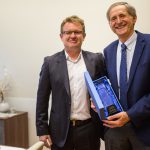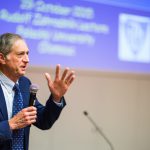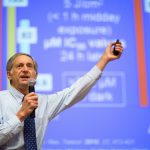Precious Metal Anticancer Agents with New Mechanisms of Action

Thursday, October 29, 2015. 12:15 pm
Assembly hall of Faculty of Science, 17. listopadu 12, Olomouc
Abstract
Platinum complexes are the most widely used anticancer drugs. We are investigating the design of anticancer agents of other precious metals that might be effective against a wider range of cancers, have less side effects, a different mechanism of action, and therefore be effective against platinum-resistant cancers.
I will describe our research on low-spin d6 complexes of ruthenium, osmium, iridium and platinum. The activation of these inert complexes in cells can be controlled by the choice of the ligands and by irradiation with light. Attack on DNA can be switched to perturbation of the redox balance in cancer cells. Organometallic transfer hydrogenation catalysts induce both oxidative and reductive stress. We are adopting a systems pharmacology approach to elucidating mechanisms of action using genomic, transcriptomic and proteomic screening. Unexpectedly, our work on complexes encapsulated in polymer micelles for drug delivery has led to the observation of single metal atom dynamics.
Download full information PDF file
Peter Sadler obtained his BA, MA and DPhil at the University of Oxford. Subsequently he was a Medical Research Council Research Fellow at the University of Cambridge and National Institute for Medical Research. From 1973-96 he was Lecturer, Reader and Professor at Birkbeck College, University of London, and from 1996-2007 Crum Brown Chair of Chemistry at the University of Edinburgh. In June 2007 he took up a Chair in Chemistry at the University of Warwick and was Head of Department for 3 years. He is a Fellow of the Royal Society of Edinburgh (FRSE) and the Royal Society of London (FRS), a European Research Council Advanced Investigator, EPSRC RISE Fellow, and Mok Hing-Yiu Distinguished Visiting Professor at the University of Hong Kong. Recently he was Marlies and Hans Zimmer International Scholar at the University of Cincinnati, Davison Lecturer at MIT, Distinguished Lecturer at Roger Williams University, Rhode Island, Glenn Seaborg Lecturer at the University of California, Berkeley, Australian Academy of Science Selby Fellow, and Swiss Chemical Society Lecturer.
His research interests are centred on the coordination chemistry of metals in medicine, in particular on the design of organometallic anticancer complexes, photoactivated chemotherapeutic agents, catalytic drugs, and the dynamics of precious metals at atomic resolution.
Gallery






